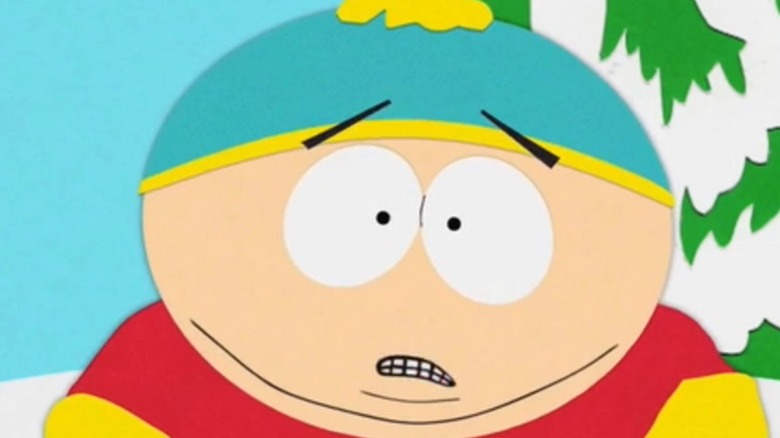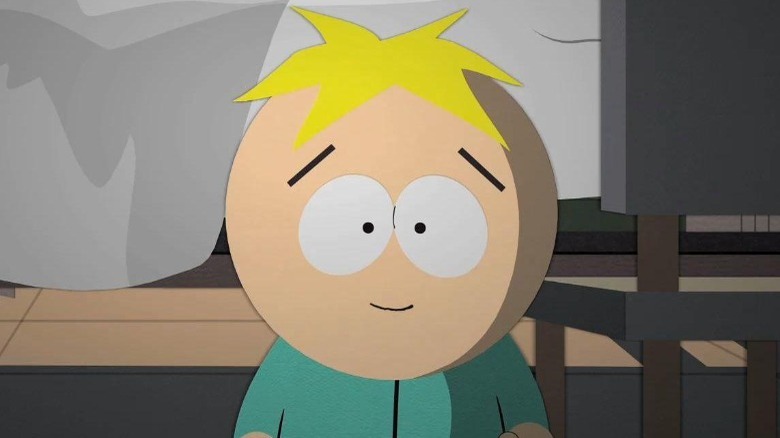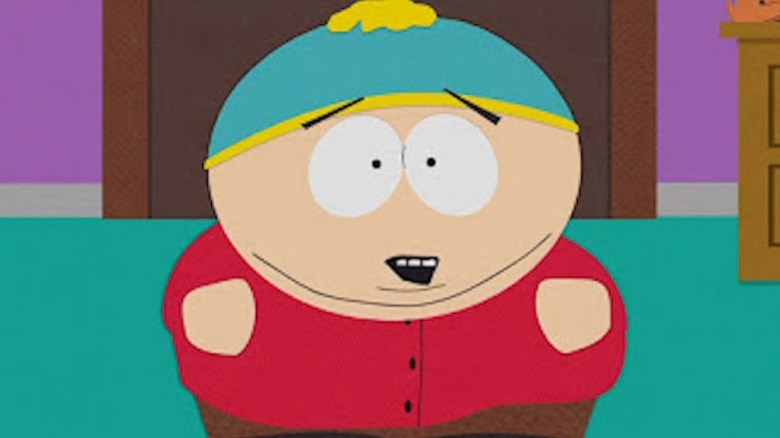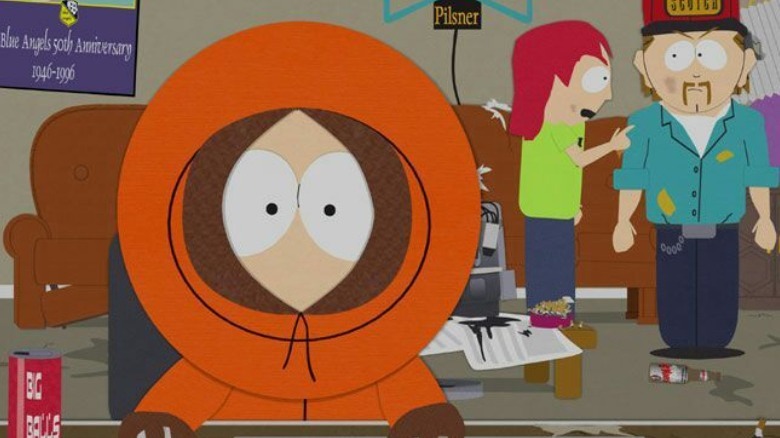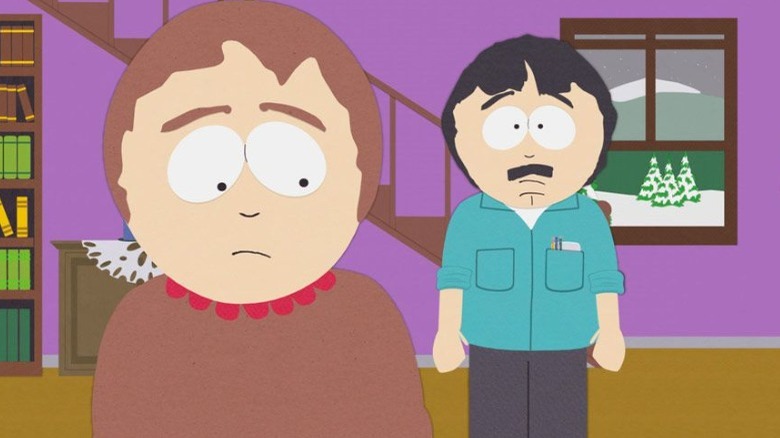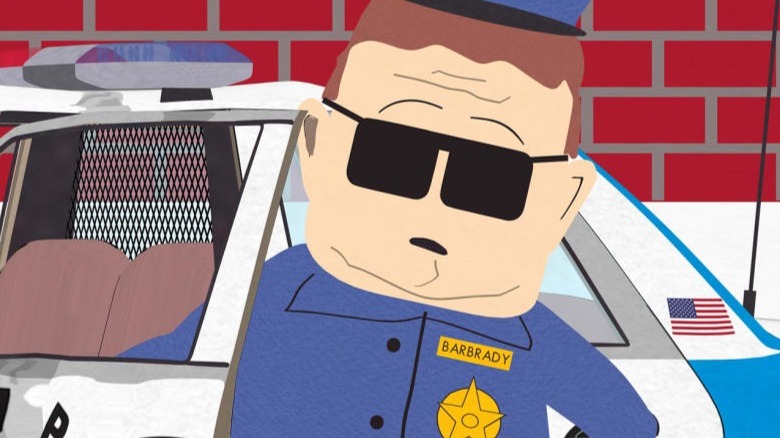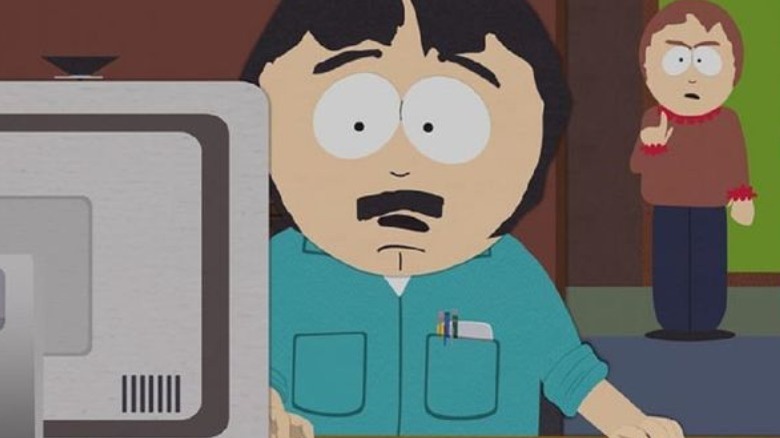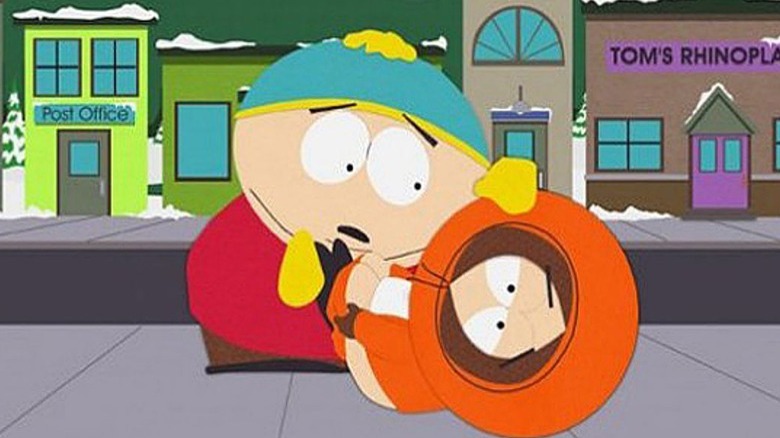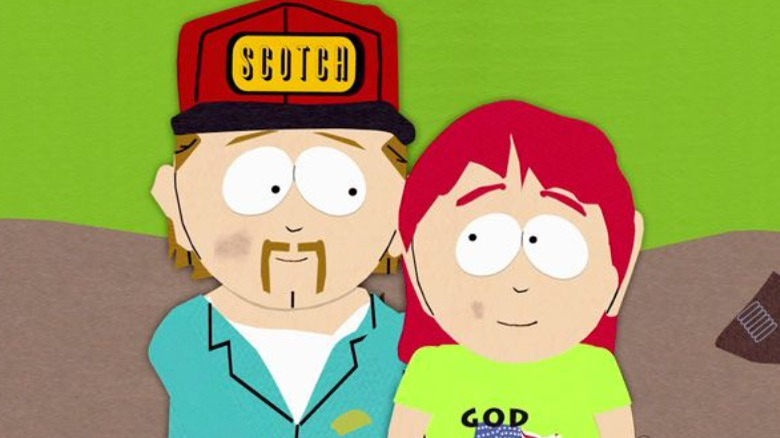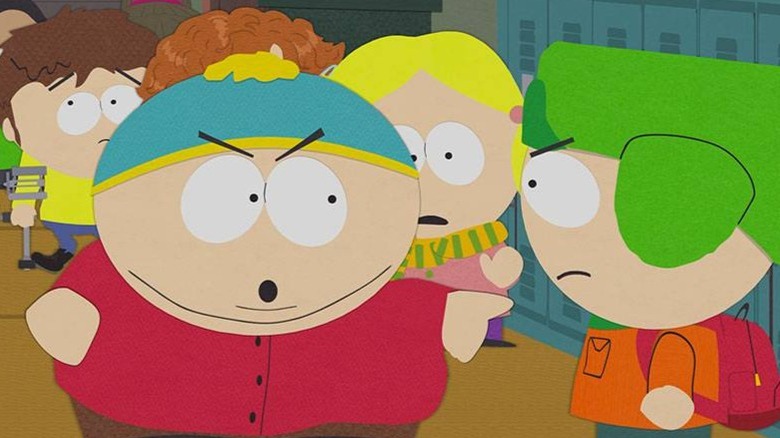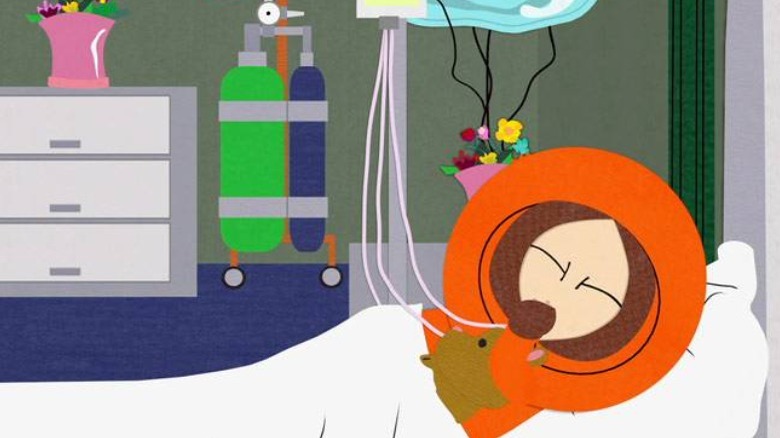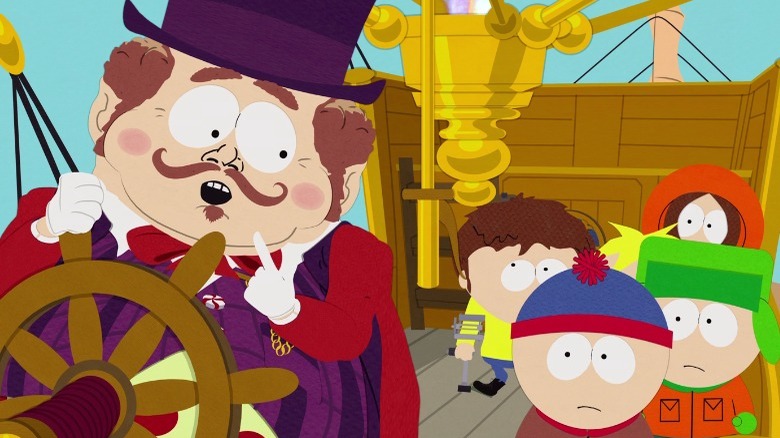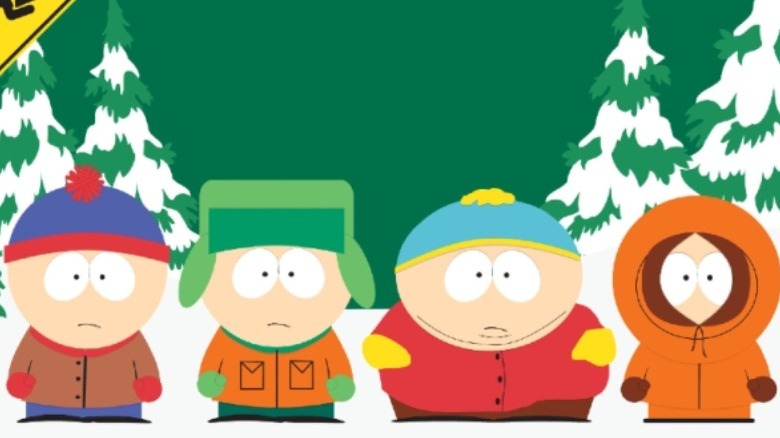South Park Fan Theories That Change Everything
Shortly after coming on the air in 1997, "South Park" became a cultural phenomenon, and in the years since has wielded a huge influence on the animation landscape. With dark humor, shocking plots, and frequent profanity, it was one of the first animated series to be targeted squarely at adults. Following Stan Marsh, Kyle Broflovski, Eric Cartman, and Kenny McCormick along with a host of other eccentric characters, the show also overcame a perceived shortcoming of animation — timeliness — satirizing current events and celebrities in almost real time.
After 23 seasons "South Park" continues to roll along, even having earned five Emmy Awards and an Oscar nomination. With all those stories and crazy happenings, Trey Parker and Matt Stone's show has given rise to a number fan theories. Some are elaborate, some are insightful, many are just plain silly — below, some of the best attempts to explain all the surreal moments we've seen unfold in that snowy Colorado haven of South Park.
The show is Butter's memory of what happened
Butters may not have been one of the main characters when "South Park" first began, but he has steadily gained more prominence. At one point, the character even temporarily replaced Kenny as a regular in the quartet of kids for a season. His interactions with the group, and Cartman in particular, are now frequent enough that Butters has become an important part of the show, leading to some theories around the character's emergence.
According to this theory, "South Park" depicts the events of the gang, being retold by Butters as an adult to his therapist. Innocent and gullible, Butters is easily manipulated by the other kids, rendering him likely to believe that the more fantastical elements of the episodes really happened — and less likely to question the wacky elements. But, you may ask, why would he be in therapy? As the butt of so many jokes and pranks, this theory supposes, Butters has developed a need to come to terms with his mistreatment, finally filling in is therapist about all the cruel — albeit, entertaining — abuse he suffered.
Cartman knows Kenny dies due to an eye transplant
One of the longest-running mysteries on "South Park" revolves around why no one ever remembers that Kenny dies in every single episode of the show. In the early seasons in particular, Kenny perished in a multitude of agonizing, miserable ways, each time resurrected by the next episode — without anyone commenting on it.
In the series, it was explained in the episode "Coon and Friends" (Season 14, Episode 13) that his parents' involvement in Cthulhu cult meetings were to blame. Every time Kenny was killed, we learned his mother would give birth to him again the next night, as he almost instantly grew to the age he was before death.
While hardly anybody every seemed to recall these events, at least one person has shown some awareness. Cartman has appeared at times to acknowledge Kenny's death, explaining what's going on to Stan and Kyle but never making any progress. According to one theory, the reason Cartman knows about Kenny's fate is because of an eye transplant he once received from Kenny's frozen head. The argument says that this transplanted eye gave Cartman the ability to see things from Kenny's perspective, allowing him to become aware of his recurring deaths — and apparent immortality.
Kenny's deaths trigger a loop that stops the characters from aging
In case you haven't picked up on this yet, many "South Park" theories are obsessed with making sense of Kenny's supernatural tendencies to return from the realm of the dead, time and again. Like most animated shows, the characters in "South Park" never age; What makes "South Park" unique, however, is there is a continuity and passage of time, with things like presidential elections taking place to match real-world events.
One explanation for the phenomena of "South Park" residents people never aging while the world grows and evolves around them is a theory that the town is stuck in a time loop — and it's all Kenny's fault. The same spell that keeps Kenny coming back to life is also warping time around him, causing strange fluctuations for the entire town, and constantly resetting time to before he died. In essence, this keeps everyone the same age but allows them to gain experience and remember events that occur around them. It also gives some explanation as to why the kids have apparently matured and become more adult-like without getting any older.
Randy and Sharon are siblings
Randy and Sharon March are two of the most frequently-glimpsed adult characters on "South Park," and over the years have only become more central characters. The parents of Stan and Shelly, they are prominent adults in a series that typically focuses on children. The pair have been involved in a lot of storylines over the years, most propelled by Randy's proclivity for getting caught up in strange situations that lead to bizarre consequences.
There's a crazy fan theory about Randy and Sharon that may seem hard to believe at first, but considering all the surreal storylines "South Park" has given viewers, it feels somewhat plausible. The theory supposes that Stan's parents are half-siblings, and for evidence points to instances when Sharon referred to Randy's father Marvin as her dad.
In the episode "Something Wall-Mart This Way Comes" (Season 8, Episode 9), with Marvin employed at the town's Wall-Mart store, Sharon is asked by Sheila if he is her father; she says yes. But in the episode "Grey Dawn" (Season 7, Episode 10) it was confirmed that Marvin's last name was Marsh (same as Randy), and in the episode "My Future Self 'n' Me" (Season 6, Episode 16), it is confirmed that Sharon's maiden name was Kimble. So, is it possible that Marvin fathered both halves of this married couple, with different women?
Of course, there's also a counter theory that shoots this whole thing down: Like many married people, Sharon merely drops the "in-law" when referring to her spouse's parent as a show of affection.
Officer Barbrady is not a real police officer
Officer Barbrady is the main police presence in "South Park," serving the town's population and keeping the peace. Well, at least he tries.
But like the rest of the adults in the series, Barbrady is incompetent more often than not, and you'd hardly point to him as a shining example of his profession. True, he might not be as corrupt or evil as many of the other characters and he has been fired multiple times — but if you have a crime to solve, you'd probably want to call just about anyone else.
There might be a good reason for this. A 2012 theory speculates that the character is simply a regular citizen who has come to believe he is part of the police, but is not actually employed by them in any way.
According to this theory, the rest of the town feels sorry for Barbrady, so they maintain the pretense as a way to keep him content (and occupied). As evidence, the theory points towards his fake-looking police badge, no one ever calling him to solve real crimes, and his consistent lack of partners and colleagues. Barbrady has always operated as a sort of "one-man team," out of a small building with other characters seemingly coming and going from what seems like his own personal jail. Even in a small town, it would be unusual for an officer of the law to possess such autonomy. So, is it possible his appearances on "South Park" are actually a kind, elaborate gesture from the townspeople to maintain the delusion of a grown man playing cops and robbers?
South Park is purgatory for idiots
If you've watched more than a few episodes of "South Park," you may have picked up on a the theme that adults are depicted largely as incompetent buffoons. Yet, somehow, the adults of South Park run successful businesses and live as independent adults, something that would seem contradictory.
One theory for this is that the town of South Park is a sort of purgatory, where deceased folks considered too stupid to mix with others are sent to spend eternity. This is why there are so many idiots in the town, as they are all put there deliberately, in an apparent attempt to maintain heaven as a place for the more intelligent, well-behaved, and generally civil.
This arguments is bolstered by the town's abnormally frequent interactions with the Devil and Jesus. Their frequent appearances, it is speculated, are actually attempts by them to improve these poor souls, trying to move them forward to either heaven or hell. As for the children of "South Park"? Well, perhaps they are angels, sent to the town to observe ("Wings of Desire"-style) the worst aspects of humanity.
Cartman and Kenny's souls are linked
Here's another theory that aims to answer the question of why Cartman is one of the few people who seems to notice Kenny's many deaths. Supposedly, it's all tied back to something Cartman did in Season 6.
The episode "A Ladder to Heaven" (Season 6, Episode 12) shows Cartman mixing Kenny's ashes with milk and then drinking it, giving him the ability to see many of his past experiences. Cartman is possessed by Kenny's soul in the episode, forming a strong link between them.
The argument is that this event rendered Cartman immune to the memory loss that seems to plague everyone else in the town when it comes to Kenny's deaths and subsequent renewals. It makes sense, in a way, to argue that Cartman and Kenny seem to have some sort of soul connection. It's also worth noting that Season 6 is generally considered the period when "South Park" masterminds Trey Parker and Matt Stone abandoned the conceit of killing Kenny every episode — so, perhaps, Cartman's soul connection helped him break his "Groundhog Day"-like cycle of death.
"It might be possible that Cartman and Kenny have a strong connection that none of the other characters have as either the result of the transplant or drinking the ashes, even if they aren't exactly the best of friends," a 2021 ScreenRant article explains. "It's also possible that this is just the writers not keeping track of 'South Park”s continuity and adding these bits of awareness from Cartman as a 'breaking the fourth-wall' sort of moment, all as part of the show's humor."
Kenny's family is poor because of his many funerals
Kenny has a pretty tough existence in "South Park." Not only did he die in so many early episodes, but his family life has always been something of a shambles. His parents don't seem to love him in any meaningful way, and they are far from ideal adult influences, as they are both alcoholics who have also been known to abuse drugs. These largely-absent parents seem like they can barely feed the kid, with Kenny seen eating Pop-Tarts, microwave pizza, or frozen waffles for dinner and bread sandwiches for breakfast — seemingly, it's all they can afford.
There's an interesting theory on why Kenny's parents are so poor. With the youngster dying so many times, his parents have been forced to pay for hundreds of funerals.
Think about it: Even the simplest of services and burials would still cost in the thousands of dollars. It is estimated that Kenny has died about 100 times on "South Park," so if you do the math, that would be one expensive child to parent. Having to pay for a funeral every few weeks would financially cripple anyone — and as if that debt wouldn't be enough to take a toll on them, imagine the unending grief cycle of having your child die over and over again. No wonder they drink.
Cartman is in love with Kyle
Cartman is possibly the most unliked, unpopular child in the whole town — but he sure does make "South Park" viewers laugh. His exchanges have particularly been hilarious with Kyle, as the two of them frequently get testy right off the bat — and although their group generally stays together and somewhat has each other's backs, it's safe to say if there are two members of the friends who hate each other, it's Kyle and Cartman.
Or do they?
A 2016 theory supposes that all this animosity between Cartman and Kyle is because the big-boned child has a subconscious attraction to him. In the same way that young boys tend to pull the pigtails of girls who they like, this theory contends that Cartman loves to rile up Kyle because he doesn't understand the line between attention and affection.
It's an interesting theory, one that also explains why Cartman continues to hang out with Kyle all these years later, spending huge amounts of time with him even as he seems to be annoyed by his friend more than almost anyone else in his life.
Kenny is in a coma
"The Simpsons" has one; so does "Family Guy." It's no surprise, then, that "South Park" would also have a fan-driven theory that the entire series is taking place in the mind of a main character in a comatose state.
The theory in question argues that everything viewers get to see in "South Park" is the imagination of Kenny. According to the theory, Kenny has been in a coma since some time before the first episode, and the events of the following twenty years are essentially his dreams. A television in his hospital room unconsciously keeps him up to date with current events, as do friends who visit and speak about current events (much like the Homer Simpson theory), feeding him fodder for his imagination.
But since Kenny can only draw upon the visuals of what he saw before his accident, the boy's mind adapts what he hears into stories in which everyone is the same age (and level of personal growth) he recalls. Those frequent deaths that Kenny experiences? Perhaps this is his brain's way of attempting to rationalize the accident that nearly killed him.
South Park is part of a supernatural experiment
South Park rarely seems like a normal town; the events that occur range from odd to insane, whether it is visits from Jesus, talking poos or alien probing. So many unbelievable things happen in this Colorado town, in fact, that it seems there must be some underlying reason.
A theory attempts to provide one by speculating that the town is being subjected to some sort of supernatural experiment. A secret organization (possibly the Illuminati or some similar group) is using South Park as a test ground for the dark arts, trying out scenarios they could next unleash on the entire planet. The experiment has trapped the town in a time-loop (there's that word again, still focusing on the fact that none of these kids have aged in nearly a quarter decade) that has made Kenny immortal, and unleashed paranormal, bizarre occurrences on the town of "South Park." Sure, it seems unlikely — but really, is "Twin Peaks" all that different with theories that its proximity to the woods and the location on the town have cast some strange spell over its residents?
The main characters represent the Four Horsemen of the apocalypse
For the most part, "South Park" focuses on the exploits of the four main characters: Stan, Kyle, Cartman, and Kenny. One theory proposed by a fan suggests that these four characters represent something far more complicated than the four kids we see before us. They depict, in fact, the Four Horsemen of the Apocalypse.
Kenny and Cartman, it is supposed, represent Death and Conquest. Kenny is associated with death (having died hundreds of times) and even wears his hood around his head to hide his face, like most depictions of the Grim Reaper. Meanwhile, Cartman has a strong desire to rule over people and dominate them, viewing others as inferiors, making him a representation of Conquest.
Kyle's connection to the Horsemen is less clear, but since he is quick to argue with those he disagrees with and willing to fight for what he believes in, War seems like the most likely candidate. Then there's Stan, who would have to be Famine .. and this is basically where the theory falls apart.
"Maybe Chaos itself?" the theorist suggests. "I know that's not a Horseman, but it certainly would lend credence to all the insanity that surrounds his life."
Like many theories on "South Park," it begins to fall apart under closer scrutiny. Still, it's fun to consider such notions, and certainly gives you a whole new way to appreciate what has become one of the defining series for multiple generations.
